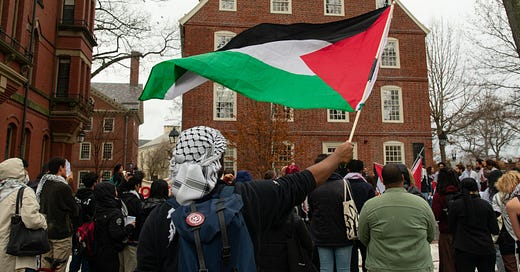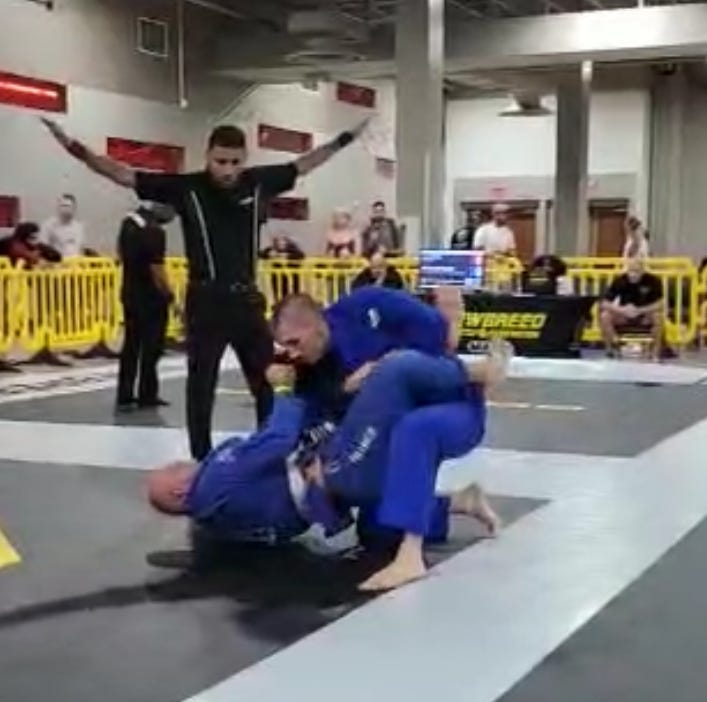“Fate, it seems, is not without a sense of irony.” - Morpheus
“The discipline of suffering, of great suffering- do you not know that only this discipline has created all enhancements of man so far? That tension of the soul in unhappiness which cultivates its strength, its shudders face to face with great ruin, its inventiveness and courage in enduring, preserving, interpreting, and exploiting suffering, and whatever has been granted to it of profundity, secret, mask, spirit, cunning, greatness- was it not granted to it through suffering, through the discipline of great suffering?” - Freidrich Nietzsche
When I was in high school I spent months in a state of true starvation. I was not religious, nor was I anorexic. Rather, I was a wrestler. After swimming and running cross country all summer and fall in 2002 I weighed approximately 165 pounds. I was a lean and growing young man. I wrestled in the 135 pounds weight category that entire season, which meant that I had to shed virtually all of my excess body fat and then 10-15 pounds of water weight before each competition (which took place on a weekly basis during the 4 months of the season). My routine was thus: I would wake up around 6am and drive to school. If it was the day or two before a competition I would don trash bags under my sweats (if it was just a regular day I would not) and I would run the halls for 45-60 minutes before my first class. I would sometimes go in and work out during lunch or free periods, and I would practice after school for 2-2.5 hours, every day. Saturdays were also usually eaten up by practices, or day-long tournaments. My average caloric intake during these months was certainly less than 1,000 calories. I would bring a peanut butter sandwich for my lunch and nibble small pieces off of it, and I savored my morning banana more than most people enjoy entire large meals. I would make ‘milkshakes’ with ice and artificial sweetener and tiny amounts of condensed milk. The coldness helped with what felt like a low-grade fever and headache that never seemed to leave. I would fall asleep in class and awake with pools of saliva drenching my shirt. I dreamt of nothing but food and I could smell a meal from hundreds of yards away. I didn’t defecate for an entire month. I lost my sexual desire altogether, which was probably the biggest warning of the extremes to which I was pushing my body.
Why did I do all of this? the 145 pound weight class had a great, senior wrestler (Mike Osborn) who was much stronger than me and I felt that I had a better chance at 135 pounds (and then 140 and, senior year, 145 pounds). I wanted to win and I wanted to be the most effective warrior for my tribe, so to speak. I was driven by the same group-spirit and competitive aggression which has created every political unit and won every victory for every band of humans since time began. If I had to re-do the experience I would concentrate more on building strength and I would NEVER try to cut that much weight. There were times when I would get on the mat and lose all strength and stamina after 2 minutes of wrestling, despite my hours of daily aerobic work. I was starving… but I don’t regret it. Those experiences might not always be wise but every tribulation and obstacle builds grit and confidence, once overcome. I didn’t know it then, but without that grit I might not be alive today. Certainly hopelessness and despair have killed 1,000x more of my generation than hunger and my training was a de facto developmental program to smother the tendency which many develop towards hopelessness and despair.
Rocky Balboa said to his son in the final film of that series (not including the Creed films): “The world ain't all sunshine and rainbows. It's a very mean and nasty place, and I don't care how tough you are, it will beat you to your knees and keep you there permanently if you let it. You, me, or nobody is gonna hit as hard as life. But it ain't about how hard you hit. It's about how hard you can get hit and keep moving forward… how much you can take and keep moving forward.” I can say, with some pride, that I have never stopped moving forward and I have never come close to giving up. In fact, I’ve always regarded myself as one of the strongest, of any group, and have never doubted the force of my will. That confidence is one of the great gifts of athletic competition and challenge and struggle more generally. It’s a gift that every young person should have, although it’s not easily won.
From The Harvard Crimson:
By Michelle N. Amponsah and Azusa M. Lippit,
More than 30 pro-Palestinian Harvard students participated in a 12-hour hunger strike Friday in solidarity with 17 students at Brown University who refused to eat for eight days to pressure the Brown Corporation to divest from Israel.
Nineteen students at Brown began the strike — which was originally indefinite — on Feb. 2, ahead of the Brown Corporation’s planned meetings beginning Feb. 8.
The students intended to strike until the Brown Corporation considered a resolution to divest from “companies which profit from human rights abuses in Palestine,” but they ended the strike after Brown University president Christina H. Paxson denied their request, citing “now-obsolete demands,” per the Brown Daily Herald.
The 17 students ended their strike at 5 p.m. on Feb. 9, along with the Harvard demonstrators and more than 200 other Brown students who fasted for 32 hours in solidarity.
“To send solidarity to @browndivestcoalition for their incredible hunger strike, 30+ Harvard students committed to a day-long hunger strike to prove to university corporations that we will not back down,” the Harvard Undergraduate Palestine Solidarity Coalition wrote in an Instagram post on Friday.
Violet T.M. Barron ’26, an organizer with Harvard Jews for Palestine and a Crimson Editorial editor, said in a video posted on the PSC’s Instagram that she participated in the hunger strike because “until our universities divest, they are complicit and we are complicit — because we pay tuition — in the genocide in Gaza.”
Syd D. Sanders ’24 also said in an interview posted by the PSC that he chose to participate “because we will not rest until we divest.”
Harvard was among six universities — including Yale, UChicago, and Pomona College — whose students participated in solidarity strikes with the strikers at Brown.
Perhaps you’ve already gathered the comparison I’m drawing here. When I sat down to write this I was chuckling, gloating… almost gleeful. I have absolutely nothing against the movement fighting for rights and concessions for Palestinians, but I group most of those students in a fairly pathetic category: the privileged, the soft, the confused, and the ineffectual. A 12-HOUR hunger strike? The fact that this seemed credible, laudable even, indicates that these young people have veered off the path of privilege into unmitigated fantasy. These are among the most engaged and passionate kids at the most eminent school in the United States! They might not be able to do much harm, but they will NEVER be able to serve their social roles or fulfill their duties as citizens or parents. As I reflect on this mild travesty further, I just feel sad.
Critical Theory established a new pedagogy and a new ethics and a new utopian vision: children were to be taught not to be virtuous citizens or independent thinkers or strong young people but to be activists concerned, above all, with the dismantling of the current system (curiously, much less clarity is available regarding what might rise up to take its place). The ethics is an inverted privilege pyramid, in which people and ideas are given worth according to their association with historical categories of victimization and everything is presumed to be so saturated with racism and sexism and many other ism’s that they are basically unusable: science, medicine, universities, money, jobs, police, borders… toss it all upon the scrapheap of history.
The problem is, of course, that the students who proclaim these ideas are college students, learning a kind of shallow, bastardized version of science and culture, but shying away from critical thinking (too uncomfortable). They have ambitions to become psychologists and filmmakers and lawyers. There are two issues with this:
A profound inauthenticity, in which their aims and ideals are completely contradicted by their actual lives and goals. These leads them to feel fake, a feeling which they attribute to capitalism or heteronormativity or white supremacy, rather than the glaring contradictions of their worldview. Every one of these students proclaim their dedication to avoiding complicity with the decisions of their colleges… but none withdraws. Every wok person whines endlessly about white privilege… but no woke white person ever surrenders any. Every socialist (that I’ve ever known) indicts the system… while they continue to earn and covet and hoard money and wealth. This kind of hypocrisy is deeply corrosive to the soul and it turns people from ostensible radicalism and toward a deep bitterness.
A deep, deep sense of self-absorption. Such people are often obsessed with labelling themselves, using ever more florid and intricate identifies (demisexual, BIPOC, sufferer of CPTSD, etc., differently-abled, etc.) which hide a generally vacuous and inchoate sense of self. Also, they are incredibly fragile. They lack resilience and self-reliance and they are more consumed with free-floating anxiety and existential dread and depression than any other generation in the history of humanity.
The causes of these changes are far from exclusively political and ideological. I think they have as much to do with the ‘new normal’ of engagement with the world through phones, and a parenting style which hovers and shelters and cushions but never challenges or toughens. Why wouldn’t these children (for they are children) believe that they’re fighting a holy crusade for the mythical, suffering black proletariat by placing a black square among their Instagram photos? Why wouldn’t they think that abolishing the bail system or erasing criminal penalties for mundane acts of theft and violence might cure social ills? That kind of coddling and the fantasy-based program of personal and political action is all they’ve ever known. They don’t understand incentives because they don’t understand suffering, because they haven’t experienced enough of it. Ironically, this mode of living only ensures much greater suffering (and confusion) down the line. These students will either change and grow or they will sink into self-obsession and vanity and despair.
Critical social justice helped enervate and enfeeble our children for its own ends. Ultimately this will make its goals impossible to achieve (at least by them)… but, as with so many other consequences of critical theory, we will all have to live with the consequences. Welcome to the land of the infantile and the play-acting and the broken. God help us all.







This perfectly encapsulates my concerns about the woke phenomenon. Very insightful. Holding your nerve during periods of discomfort — whether physical or emotional — does build mettle. And mettle is the underpinning of all great achievement.
I first learned this in the military. I am now learning more nuanced, granular techniques in CBT. The ability to tough out difficult times is paramount to achieving true maturity. It’s no wonder the generations that survived the Great Depression and WWII were more resilient.
We are not teaching our children well. And we are having to live in the fragmented, polarized world they are creating. I think the worst part is all of the adults who are taking advantage of their confusion and gullibility to engender their own ends.
Great title, btw.